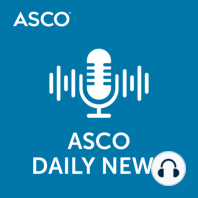11 min listen
Promising New Therapies in Lung Cancer With Dr. Stephen Liu
FromASCO Daily News
ratings:
Length:
26 minutes
Released:
Jun 21, 2021
Format:
Podcast episode
Description
Dr. Stephen Liu, associate professor of medicine and director of Thoracic Oncology and Developmental Therapeutics at the Georgetown Lombardi Comprehensive Cancer Center, highlights key abstracts in lung cancer featured at the 2021 ASCO Annual Meeting. Transcript: ASCO Daily News: Welcome to the ASCO Daily News Podcast. I'm Geraldine Carroll, a reporter for the ASCO Daily News. My guest today is Dr. Stephen Liu. He is an associate professor of medicine and the director of thoracic oncology and developmental therapeutics at the Georgetown Lombardi Comprehensive Cancer Center. Dr. Liu joins me to highlight advances in lung cancer featured at the 2021 ASCO Annual Meeting. Dr. Liu has served in a consulting or advisory role for Genentech, Pfizer, and AstraZeneca, among other organizations. His full disclosures and those relating to all episodes of the podcast are available on our transcripts at ASCO.org/podcasts. Dr. Liu, it's great to have you on the podcast today. Dr. Stephen Liu: Thanks for having me. ASCO Daily News: Dr. Liu, a lot of people were talking about the IMpower010 study during the annual meeting. That's abstract 8500, an interim analysis that showed really promising results for patients with resected non-small cell lung cancer. Can you tell us about this practice-changing study? Dr. Stephen Liu: Well, IMpower010 was a global randomized phase III trial, and I think this really was one of the highlights of the ASCO Annual Meeting from a lung cancer standpoint. As a reminder, our current standard of care is cisplatin-based chemotherapy for patients with resected stage II to III non-small cell lung cancer and for select patients with stage IB. We know from decades of experienced multiple phase III trials, large meta-analyses, that the risk of recurrence is quite high for resected stage II/III lung cancer. And the use of up to four cycles of cisplatin-based chemotherapy does lead to an improvement in survival, and that's our standard of care. That survival improvement, however, is modest, with an absolute improvement and 5-year survival of about 5%. And so we've been trying to improve outcomes in this setting for quite some time. We know from last year's ASCO that the subset of patients whose tumor harbors an EGFR mutation received some benefit from disease-free survival with the use of adjuvant osimertinib. IMpower010 presented at this year's ASCO by Dr. Heather Wakelee looks at the use of immunotherapy as a complementary adjuvant therapy. And we knew from press release that this study had met its primary endpoint. This was our first chance to look at the data first-hand and really see how it would impact practice. And I think the data were quite impressive. It's a fairly simple design. This study included patients with completely resected stage IB to IIIA non-small cell lung cancer, either histology. Note that this used AJCC version 7, and so the stage IB that were included had a size of at least four centimeters, and that's the subset that seems to derive the most benefit from chemotherapy. Now patients received cisplatin-based chemotherapy one to four cycles first. And those who received at least one cycle of chemotherapy were then randomly assigned 1 to 1 to receive 1 year of atezolizumab, PD-L1 inhibitor, or best supportive care. This was a large study, over 1,000 patients randomly assigned. It began enrollment in 2014. So it did include some EGFR and some ALK when maybe we didn't know quite as much about including those patients in these studies, but the EGFR was about 12%, the ALK was 3%. Some were unknown EGFR and ALK status, but these were likely the squamous histology, as those numbers line up. The PD-L1 testing, importantly, was done by the VENTANA SP263 assay, looking at tumor cell expression only, which is a fairly straightforward assay. And what we saw after a median follow up of almost 3 years was that in the primary high-risk population stage II to IIIA resected non-small cell lung cancer with the PD-L
Released:
Jun 21, 2021
Format:
Podcast episode
Titles in the series (100)
Spotlight on GI Cancers: Learning From the CheckMate-648 & KEYNOTE-811 Trials: Dr. Pamela Kunz, associate professor of medicine and director of the Center for Gastrointestinal Cancers at the Yale School of Medicine, discusses promising advances in metastatic esophageal squamous cell carcinoma, and HER2-positive metastatic... by ASCO Daily News
